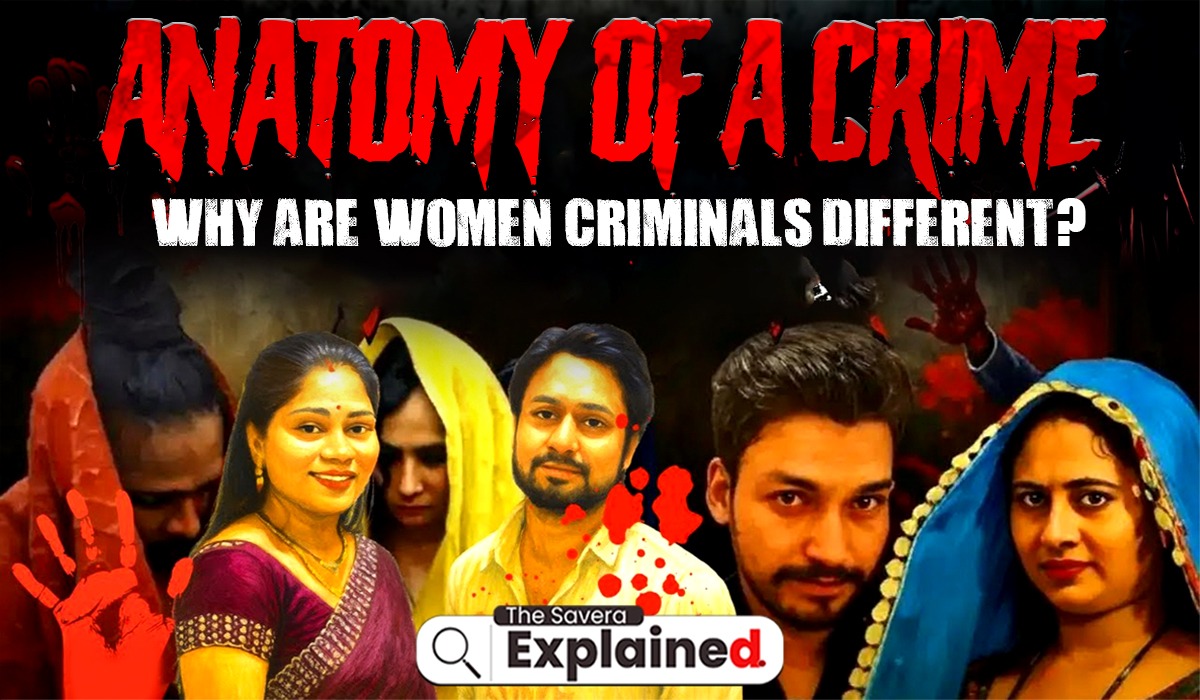In recent months, cases like Sonam Raghuvanshi and Muskan Rastogi have made headlines—not just because a heinous crime was committed, but because women were at the centre of it. When a woman is accused of killing her husband, society reacts strongly. These women are often labelled not only as criminals but also as “husband killers,” which is a term loaded with shock and judgment.
But why does it feel different when a woman commits a violent crime? Is it because we expect women to always be caring, emotional, and gentle? Well, according to experts, it can be a mix of many things—how society sees women, the pressure to be perfect, and a sense of shame they face if they step outside their traditional roles.
What Experts Say?
A woman committing a crime “not only violates a legal norm but also a gender norm”, explained G S Bajpai, a professor of criminology and vice chancellor of the National Law University in Delhi.
“Women are expected to be caring and compliant. A woman who commits crime is therefore an aberration – abnormal and exceptional. This is not true for men… She is, therefore, as some scholars have described, ‘doubly deviant and hence must be doubly punished’. Thus her gender becomes relevant to society’s response to the crime. She is not just a criminal, she is a female criminal,” Bajpai further added.
But Why Women Commit these Crime?
Women commit far fewer violent crimes than men. In India, women make up a small percentage of those arrested for serious crimes like murder. When they do commit crimes, their reasons often differ from men’s.
Experts states some common factors including:
- Escaping Abuse: Many women who kill their husbands say they faced years of physical or emotional abuse.
- Personal Motives: Unlike men, who might kill for power or money, women’s crimes are often tied to personal relationships. Betrayal, jealousy, or fear of losing a lover can drive them. In recent cases, some women allegedly killed to be with someone else or to escape a controlling spouse.
- Social Pressures: In small towns, women face strict rules about how they should behave or who should they marry. If they step outside these roles—like pursuing a career or having an affair—it can lead to conflict at home.
Now, Let’s have a look at some recent Cases That pulled the country in extreme shock:
- Sonam Raghuvanshi (Indore, Meghalaya): Sonam went on a honeymoon with her husband, Raja Raghuvanshi, to Meghalaya in May 2025. Days later, Raja’s body was found in a gorge, hacked to death. Police say Sonam hired three hitmen from Madhya Pradesh to kill him, possibly with her lover’s help. The case sparked outrage, with social media posts asking, “Why marry if you planned to kill?”
- Muskan Rastogi (Meerut): In March 2025, Muskan and her lover, Sahil Shukla, were charged with killing her husband, a merchant navy officer. They allegedly slit his throat and hid his body in a cement-filled drum. The gruesome details went viral, fueling memes and debates about “killer wives.”
- Ravina (Bhiwani, Haryana): Ravina, a YouTuber, was arrested in March 2025 for allegedly strangling her husband, Praveen, with her lover’s help. The couple fought over her social media posts, and police say she acted after Praveen caught her with her lover.
- Pragati (Auraiya, Uttar Pradesh): Just two weeks after her wedding in March 2025, Pragati allegedly hired killers to shoot her husband, Dilip. Police linked the crime to her relationship with another man, shocking the small town.
- Shivani (Bijnor, Uttar Pradesh): In April 2025, Shivani, 25, confessed to poisoning her husband, Deepak Kumar, with sleeping pills and strangling him. She told neighbors he died of a heart attack, but police uncovered the truth.
In these cases, the alleged involvement of lovers or contract killers, have painted women as cold-blooded, but the truth is more complex.
Why Are Women Criminals Treated Differently?
Society and the media treat women criminals differently due to being partial in acknowledging their roles in a society.
They labelled women’s committing crimes as:
- Breaking Stereotypes: Women are expected to be soft and nurturing, so when they commit violent crimes, it feels like a betrayal of their role. Headlines often call them “husband killers” or “evil wives,” words rarely used for men.
- Sensational Coverage: Women’s crimes get more attention because they’re rare. Media outlets focus on the gory details, like Muskan’s cement drum or Sonam’s hired hitmen, to grab viewers. This can make the crime seem more shocking than it is.
- Judging Motives: Courts and society often judge women more harshly for personal motives like infidelity, or societal hindrance. Men’s crimes, often tied to power or greed, are less likely to be framed this way.
What is Society’s Role in These Crimes
The way society treats women plays a big part in these crimes:
- Rigid Gender Roles: In small towns, women are expected to obey their husbands and in-laws. Challenging this—like Ravina did with her YouTube career—can lead to conflict that spiral out of control.
- Lack of Support: Many women have nowhere to turn. Shelters are few, and families often side with husbands due to stigma. This leaves women feeling cornered, as seen in cases where abuse was a factor.
- Social Media and Stigma: The internet amplifies judgment. Misogynistic memes and comments, like those targeting Sonam, shame women and simplify their stories, ignoring deeper issues like abuse or pressure.
People are drawn to these stories because they challenge norms. Women committing murder, especially against husbands, feels like a twist in a thriller. True crime shows and social media feed this curiosity, but they often focus on the violence rather than the reasons, like abuse or desperation.

